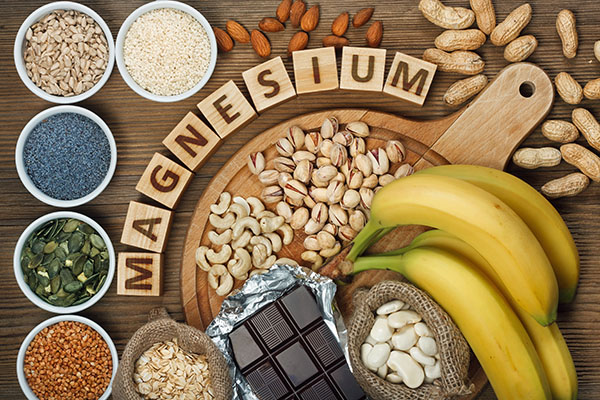 Parler
Parler Gab
Gab
 But are they really as nutritionally vapid as these label claims make them seem?
Not by a long shot.
When we apply the complementary lenses of modern scientific investigation and ancient wisdom, dates begin to look like both a holy- and a super-food of immense value.
Here's a neat example.
From the Koran to Clinical Trials: Dates for Better Birthing
In the Koran, the central holy book of Islam, Allah instructs the Virgin Mary to consume dates when she gives birth to Jesus.[1] And so, not surprisingly, dates are commonly referred to within the Islamic tradition as beneficial to pregnant women. We might chalk this up as "pre-scientific" magical thinking without basis in medical fact, were it not for a remarkable human clinical study that confirmed their value in pregnancy...
Published in the Journal of Obstetrics and Gynecology in 2011 and titled, "The effect of late pregnancy consumption of date fruit on labour and delivery", researchers set out to investigate the effect of date fruit consumption on labor parameters and birth outcomes. Over the course of 11 months at Jordan University of Science and Technology, two groups of women were enrolled in a prospective study where 69 women consumed six date fruits per day for 4 weeks prior to their estimated date of delivery, versus 45 women who consumed none. These women were matched so there was no significant difference in gestational age, age and parity (the number of times a woman has brought a pregnancy to viable gestational age) between the two groups.
The results of the date intervention were reported as follows:
But are they really as nutritionally vapid as these label claims make them seem?
Not by a long shot.
When we apply the complementary lenses of modern scientific investigation and ancient wisdom, dates begin to look like both a holy- and a super-food of immense value.
Here's a neat example.
From the Koran to Clinical Trials: Dates for Better Birthing
In the Koran, the central holy book of Islam, Allah instructs the Virgin Mary to consume dates when she gives birth to Jesus.[1] And so, not surprisingly, dates are commonly referred to within the Islamic tradition as beneficial to pregnant women. We might chalk this up as "pre-scientific" magical thinking without basis in medical fact, were it not for a remarkable human clinical study that confirmed their value in pregnancy...
Published in the Journal of Obstetrics and Gynecology in 2011 and titled, "The effect of late pregnancy consumption of date fruit on labour and delivery", researchers set out to investigate the effect of date fruit consumption on labor parameters and birth outcomes. Over the course of 11 months at Jordan University of Science and Technology, two groups of women were enrolled in a prospective study where 69 women consumed six date fruits per day for 4 weeks prior to their estimated date of delivery, versus 45 women who consumed none. These women were matched so there was no significant difference in gestational age, age and parity (the number of times a woman has brought a pregnancy to viable gestational age) between the two groups.
The results of the date intervention were reported as follows:
- Improved Cervical Dilation: "The women who consumed date fruit had significantly higher mean cervical dilatation upon admission compared with the non-date fruit consumers (3.52 cm vs 2.02 cm, p < 0.0005)."
- Less Damage to Membranes: "[The intervention group had] a significantly higher proportion of intact membranes (83% vs 60%, p = 0.007)."
- More Natural (Spontaneous) Labor: "Spontaneous labour occurred in 96% of those who consumed dates, compared with 79% women in the non-date fruit consumers (p = 0.024)."
- Less Drugs Required: "Use of prostin/oxytocin was significantly lower in women who consumed dates (28%), compared with the non-date fruit consumers (47%) (p = 0.036)."
- Shorter Labor: "The mean latent phase of the first stage of labour was shorter in women who consumed date fruit compared with the non-date fruit consumers (510 min vs 906 min, p = 0.044)."
"It is concluded that the consumption of date fruit in the last 4 weeks before labour significantly reduced the need for induction and augmentation of labour, and produced a more favourable, but non-significant, delivery outcome. The results warrant a randomised controlled trial."[2]Thanks to research like this we can see how the mythological and scientific ways of understanding now converge and confirm one another. I believe that rather than contradict and/or negate one another, the mythos and logos are beginning to assume a far more productive complementary relationship as we move into a new era of understanding where the profane and sacred are perceived as intimately entwined in our direct experience. The field of nutrition, as you can see, is no exception. Dates Contain Nourishing Information Dates, of course, are in the palm tree family, and along with coconut and red palm, are some of the oldest cultivated plants known in the historical record; in fact, they are so old we don't know where they first originated. They have provided life-sustaining nutrition in regions that are often sparse in edible resources, and are increasingly being researched as a powerful medicinal food that could reduce much suffering in malnourished and disease prone populations, especially in underdeveloped countries.
(2).gif) Even while scientific analysis of dates are beginning to reveal that they are actually densely packed with a wide range of minerals, vitamins, amino acids and fatty acids, it should be emphasized that they are not just sources of energy and material building blocks for our body. We must acknowledge that they are also sources of biologically valuable (perhaps indispensably so) information. We can not analytically decompose a food into the minerals, vitamins, and macronutrients (e.g. lipids, fats, and protein), that we believe are responsible for its nourishing and life-sustaining properties, without losing quite a lot in the process. Foods contains hundreds, if not thousands, of physiologically important biomolecules, together which modulate the expression of thousands of genes in our body, as well as affecting our microbiome. In fact, our microbiome works on the foods we ingest, and together produce an intermediary layer of biomolecules known as the metabolome, many of which may be indispensable to our health.
This is why when we say food is medicine, we are not simply using a metaphor. We now know that food is capable, on a molecular level, of positively modulating a wide range of biological pathways simultaneously, in a manner that drugs simply can not replicate. In fact, I believe food contains an immense, if not infinite, amount of information which our bodies draw from to realize optimal gene expression, especially in times of stress or imbalance. Looking at it granularly, I believe food contains discrete units or packets of gene-regulatory energy and information. This can be inferred by the way curcumin, for instance, which is only one of hundreds of biomolecules found in the spice turmeric, is capable of modulating over 2,000 genes simultaneously within a cancer cell line, with a positive end result. Both the specificity and broadness through which these food compounds are capable of correcting imbalances is simply astounding and speaks to an intelligence within certain plants of particular food and medicinal purpose that can not be exhaustively explained through terms and methods of the reductionistic sciences that still form the backbone of our understanding of conventional nutrition.
Even while scientific analysis of dates are beginning to reveal that they are actually densely packed with a wide range of minerals, vitamins, amino acids and fatty acids, it should be emphasized that they are not just sources of energy and material building blocks for our body. We must acknowledge that they are also sources of biologically valuable (perhaps indispensably so) information. We can not analytically decompose a food into the minerals, vitamins, and macronutrients (e.g. lipids, fats, and protein), that we believe are responsible for its nourishing and life-sustaining properties, without losing quite a lot in the process. Foods contains hundreds, if not thousands, of physiologically important biomolecules, together which modulate the expression of thousands of genes in our body, as well as affecting our microbiome. In fact, our microbiome works on the foods we ingest, and together produce an intermediary layer of biomolecules known as the metabolome, many of which may be indispensable to our health.
This is why when we say food is medicine, we are not simply using a metaphor. We now know that food is capable, on a molecular level, of positively modulating a wide range of biological pathways simultaneously, in a manner that drugs simply can not replicate. In fact, I believe food contains an immense, if not infinite, amount of information which our bodies draw from to realize optimal gene expression, especially in times of stress or imbalance. Looking at it granularly, I believe food contains discrete units or packets of gene-regulatory energy and information. This can be inferred by the way curcumin, for instance, which is only one of hundreds of biomolecules found in the spice turmeric, is capable of modulating over 2,000 genes simultaneously within a cancer cell line, with a positive end result. Both the specificity and broadness through which these food compounds are capable of correcting imbalances is simply astounding and speaks to an intelligence within certain plants of particular food and medicinal purpose that can not be exhaustively explained through terms and methods of the reductionistic sciences that still form the backbone of our understanding of conventional nutrition.
(2).jpg) So if my theory holds true, and dates, which are a food type (namely, fruit) we co-evolved with for quite some time, are more than just a package of mainly simple carbohydrate (half fructose/half glucose) and mineral quantities of alphabetic vitamins and minerals, but also possess gene-regulatory energy and information, shouldn't it perform a number of therapeutic effects? Indeed, the research now bears testimony to exactly this fact.
I took the liberty of doing a cursory meta-analysis of the extant research on dates available through the National Library of Medicine's biomedical database MEDLINE, accessible of course through the google-like search engine pubmed.gov. And to my pleasant surprise the research on dates as a whole (including the fruit, pollen and seed extract) reveals approximately 19 specific beneficial modes of action, and a preventive and/or therapeutic role in about 40 different health conditions.
Consider for a moment that most of the blockbuster drugs on the marketplace only have one therapeutic mode of action and one condition they are approved to treat. Additionally, there are on average 75 adverse health effects for each drug. The fact that it is classified and sold as a food and not a drug should not delude us into thinking it is not as powerful as a pharmaceutical. In fact, it should be clear that foods are actually far more powerful in affecting root cause resolution of health conditions by nourishing us deeply, nutritionally, and again, informationally (literally: to put form into).
To gain greater familiarity with the literature demonstrating the various therapeutic properties of dates, view our Date research page. You will notice that one of the potential therapeutic properties of dates are its beneficial properties in diabetes - which underscores our original point, that if you go by nutrition facts panels alone you are bound to miss out on a number of healthy foods include fruits like dates
So if my theory holds true, and dates, which are a food type (namely, fruit) we co-evolved with for quite some time, are more than just a package of mainly simple carbohydrate (half fructose/half glucose) and mineral quantities of alphabetic vitamins and minerals, but also possess gene-regulatory energy and information, shouldn't it perform a number of therapeutic effects? Indeed, the research now bears testimony to exactly this fact.
I took the liberty of doing a cursory meta-analysis of the extant research on dates available through the National Library of Medicine's biomedical database MEDLINE, accessible of course through the google-like search engine pubmed.gov. And to my pleasant surprise the research on dates as a whole (including the fruit, pollen and seed extract) reveals approximately 19 specific beneficial modes of action, and a preventive and/or therapeutic role in about 40 different health conditions.
Consider for a moment that most of the blockbuster drugs on the marketplace only have one therapeutic mode of action and one condition they are approved to treat. Additionally, there are on average 75 adverse health effects for each drug. The fact that it is classified and sold as a food and not a drug should not delude us into thinking it is not as powerful as a pharmaceutical. In fact, it should be clear that foods are actually far more powerful in affecting root cause resolution of health conditions by nourishing us deeply, nutritionally, and again, informationally (literally: to put form into).
To gain greater familiarity with the literature demonstrating the various therapeutic properties of dates, view our Date research page. You will notice that one of the potential therapeutic properties of dates are its beneficial properties in diabetes - which underscores our original point, that if you go by nutrition facts panels alone you are bound to miss out on a number of healthy foods include fruits like dates
 Read more at: GreenMedInfo.com
Read more at: GreenMedInfo.com
Scientists discover an enormous underwater mountain off the coast of Guatemala
By Zoey Sky // Share
Magnesium’s importance far greater than previously imagined
By News Editors // Share
Study: Maternal distress can set the stage for childhood behavioral issues
By Olivia Cook // Share
Ginger: 10,000x stronger than chemo (Taxol) in cancer research model
By News Editors // Share
Governments continue to obscure COVID-19 vaccine data amid rising concerns over excess deaths
By patricklewis // Share
Tech giant Microsoft backs EXTINCTION with its support of carbon capture programs
By ramontomeydw // Share
Germany to resume arms exports to Israel despite repeated ceasefire violations
By isabelle // Share










